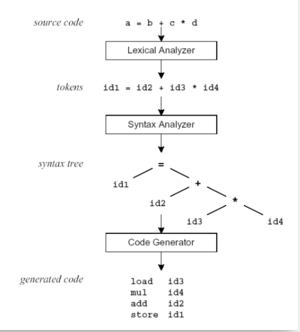Difference between revisions of "Lex Tutorial"
Jump to navigation
Jump to search
(→Lex) |
|||
| Line 4: | Line 4: | ||
* The lexical analyzer is a program that transforms an input stream into a sequence of tokens. | * The lexical analyzer is a program that transforms an input stream into a sequence of tokens. | ||
* It reads the input stream and produces the source code as output through implementing the lexical analyzer in the C program. | * It reads the input stream and produces the source code as output through implementing the lexical analyzer in the C program. | ||
| + | ===The function of Lex is as follows:=== | ||
| + | * Firstly lexical analyzer creates a program lex.1 in the Lex language. Then Lex compiler runs the lex.1 program and produces a C program lex.yy.c. | ||
| + | * Finally C compiler runs the lex.yy.c program and produces an object program a.out. | ||
| + | * a.out is lexical analyzer that transforms an input stream into a sequence of tokens. | ||
Revision as of 00:31, 10 August 2020
Lex
- Lex is a program that generates lexical analyzer. It is used with YACC parser generator.
- The lexical analyzer is a program that transforms an input stream into a sequence of tokens.
- It reads the input stream and produces the source code as output through implementing the lexical analyzer in the C program.
The function of Lex is as follows:
- Firstly lexical analyzer creates a program lex.1 in the Lex language. Then Lex compiler runs the lex.1 program and produces a C program lex.yy.c.
- Finally C compiler runs the lex.yy.c program and produces an object program a.out.
- a.out is lexical analyzer that transforms an input stream into a sequence of tokens.
